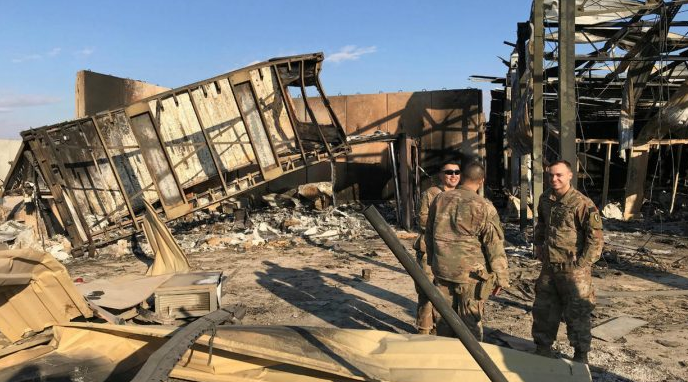Three people have been killed after a base hosting US and UK troops in Iraq was hit by a rocket attack.
At least 12 people were injured in the attack on the Taji military camp, north of Baghdad.
US military sources said an American soldier, an American contractor and a British soldier were killed. No names have yet been released.
Tension has been high since the US killed senior Iranian commander Qasem Soleimani in a drone strike in January.
A retaliatory Iranian strike on al-Asad – another base hosting US troops – on 8 January left more than 100 soldiers suffering from traumatic brain injuries (TBI).
However, both Iran and the US appeared then to want to draw a line under the matter and there have been no major flare-ups since.
A statement from the US-led coalition in Iraq and Syria confirmed that 18 rockets had struck the base and three coalition personnel had been killed.
In an earlier tweet, a spokesman for the coalition said the attack happened at 19:35 local time (16:35 GMT) on Wednesday. He added that an investigation had been launched.

The UK Ministry of Defence said in a statement that the British soldier who was killed was a member of the Royal Army Medical Corps.
“The service person’s family have been informed and have requested a period of privacy before further details are released,” the statement said.
UK Defence Secretary Ben Wallace called the attack a “cowardly and retrograde act”.
He said his thoughts were with the families of those killed or injured, adding: “We shall not forget their sacrifice and will ensure those who committed these acts face justice.”
Earlier, UK Prime Minister Boris Johnson said the attack was “deplorable”.
“The foreign secretary has spoken to the US secretary of state and we will continue to liaise with our international partners to fully understand the details of this abhorrent attack,” he said.
No-one has said they were responsible for the attack and the US and UK have not yet attributed blame. But, in the past, Washington has accused Iran-backed factions in Iraq of carrying out similar strikes.
There have been reports of retaliatory air strikes elsewhere in Iraq, close to the Syrian border, but these have not been confirmed.
Why is Iraq drawn into the US-Iran confrontation?
Tensions between the arch-foes intensified last year, after Iran-backed militia fighters targeted US military and civilian personnel in a series of rocket attacks. There were also unclaimed air strikes in Iraq targeting militia facilities and Iranian officials.
In late December, a rocket attack on an Iraqi military base killed a US civilian contractor.
The US blamed the powerful Kataib Hezbollah militia, which is part of the paramilitary Popular Mobilisation force. It carried out air strikes on its bases in western Iraq and eastern Syria that left at least 25 fighters dead.
The US embassy in Baghdad was then attacked by crowds of protesters and President Donald Trump warned Iran it would “pay a very big price”.
On 3 January, Mr Trump authorised a drone strike near Baghdad airport that killed Soleimani – commander of the Islamic Revolution Guard Corps Quds Force and architect of Iranian policy in the Middle East – and Kataib Hezbollah leader Abu Mahdi al-Muhandis.



